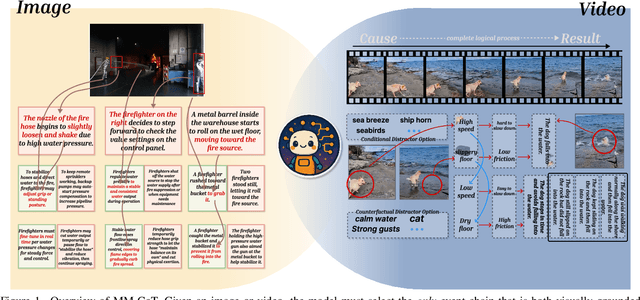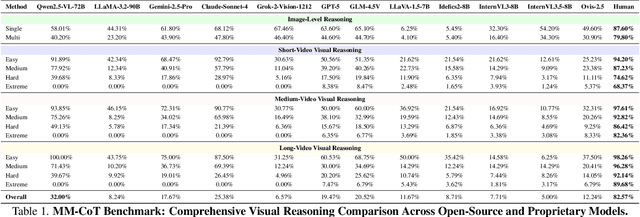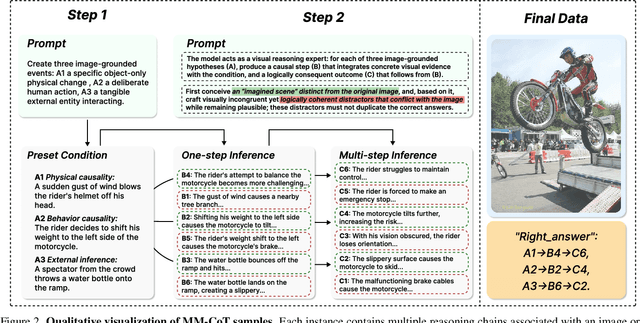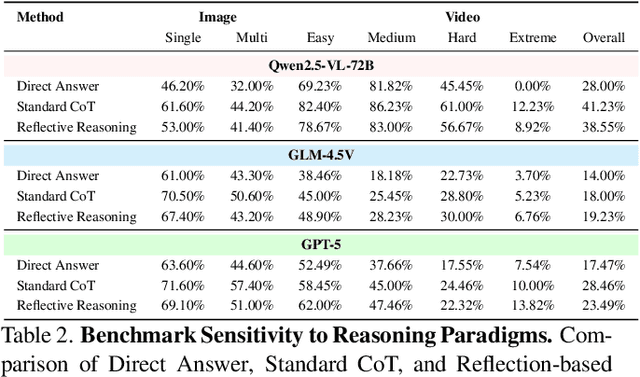Yijia Fan
Why Keep Your Doubts to Yourself? Trading Visual Uncertainties in Multi-Agent Bandit Systems
Jan 26, 2026Abstract:Vision-Language Models (VLMs) enable powerful multi-agent systems, but scaling them is economically unsustainable: coordinating heterogeneous agents under information asymmetry often spirals costs. Existing paradigms, such as Mixture-of-Agents and knowledge-based routers, rely on heuristic proxies that ignore costs and collapse uncertainty structure, leading to provably suboptimal coordination. We introduce Agora, a framework that reframes coordination as a decentralized market for uncertainty. Agora formalizes epistemic uncertainty into a structured, tradable asset (perceptual, semantic, inferential), and enforces profitability-driven trading among agents based on rational economic rules. A market-aware broker, extending Thompson Sampling, initiates collaboration and guides the system toward cost-efficient equilibria. Experiments on five multimodal benchmarks (MMMU, MMBench, MathVision, InfoVQA, CC-OCR) show that Agora outperforms strong VLMs and heuristic multi-agent strategies, e.g., achieving +8.5% accuracy over the best baseline on MMMU while reducing cost by over 3x. These results establish market-based coordination as a principled and scalable paradigm for building economically viable multi-agent visual intelligence systems.
3D-Agent:Tri-Modal Multi-Agent Collaboration for Scalable 3D Object Annotation
Jan 07, 2026Abstract:Driven by applications in autonomous driving robotics and augmented reality 3D object annotation presents challenges beyond 2D annotation including spatial complexity occlusion and viewpoint inconsistency Existing approaches based on single models often struggle to address these issues effectively We propose Tri MARF a novel framework that integrates tri modal inputs including 2D multi view images textual descriptions and 3D point clouds within a multi agent collaborative architecture to enhance large scale 3D annotation Tri MARF consists of three specialized agents a vision language model agent for generating multi view descriptions an information aggregation agent for selecting optimal descriptions and a gating agent that aligns textual semantics with 3D geometry for refined captioning Extensive experiments on Objaverse LVIS Objaverse XL and ABO demonstrate that Tri MARF substantially outperforms existing methods achieving a CLIPScore of 88 point 7 compared to prior state of the art methods retrieval accuracy of 45 point 2 and 43 point 8 on ViLT R at 5 and a throughput of up to 12000 objects per hour on a single NVIDIA A100 GPU
FlashVLM: Text-Guided Visual Token Selection for Large Multimodal Models
Dec 23, 2025



Abstract:Large vision-language models (VLMs) typically process hundreds or thousands of visual tokens per image or video frame, incurring quadratic attention cost and substantial redundancy. Existing token reduction methods often ignore the textual query or rely on deep attention maps, whose instability under aggressive pruning leads to degraded semantic alignment. We propose FlashVLM, a text guided visual token selection framework that dynamically adapts visual inputs to the query. Instead of relying on noisy attention weights, FlashVLM computes an explicit cross modal similarity between projected image tokens and normalized text embeddings in the language model space. This extrinsic relevance is fused with intrinsic visual saliency using log domain weighting and temperature controlled sharpening. In addition, a diversity preserving partition retains a minimal yet representative set of background tokens to maintain global context. Under identical token budgets and evaluation protocols, FlashVLM achieves beyond lossless compression, slightly surpassing the unpruned baseline while pruning up to 77.8 percent of visual tokens on LLaVA 1.5, and maintaining 92.8 percent accuracy even under 94.4 percent compression. Extensive experiments on 14 image and video benchmarks demonstrate that FlashVLM delivers state of the art efficiency performance trade offs while maintaining strong robustness and generalization across mainstream VLMs.
PTTA: A Pure Text-to-Animation Framework for High-Quality Creation
Dec 21, 2025Abstract:Traditional animation production involves complex pipelines and significant manual labor cost. While recent video generation models such as Sora, Kling, and CogVideoX achieve impressive results on natural video synthesis, they exhibit notable limitations when applied to animation generation. Recent efforts, such as AniSora, demonstrate promising performance by fine-tuning image-to-video models for animation styles, yet analogous exploration in the text-to-video setting remains limited. In this work, we present PTTA, a pure text-to-animation framework for high-quality animation creation. We first construct a small-scale but high-quality paired dataset of animation videos and textual descriptions. Building upon the pretrained text-to-video model HunyuanVideo, we perform fine-tuning to adapt it to animation-style generation. Extensive visual evaluations across multiple dimensions show that the proposed approach consistently outperforms comparable baselines in animation video synthesis.
LLM-CAS: Dynamic Neuron Perturbation for Real-Time Hallucination Correction
Dec 21, 2025Abstract:Large language models (LLMs) often generate hallucinated content that lacks factual or contextual grounding, limiting their reliability in critical applications. Existing approaches such as supervised fine-tuning and reinforcement learning from human feedback are data intensive and computationally expensive, while static parameter editing methods struggle with context dependent errors and catastrophic forgetting. We propose LLM-CAS, a framework that formulates real-time hallucination correction as a hierarchical reinforcement learning problem. LLM-CAS trains an agent to learn a policy that dynamically selects temporary neuron perturbations during inference based on the current context. Unlike prior dynamic approaches that rely on heuristic or predefined adjustments, this policy driven mechanism enables adaptive and fine grained correction without permanent parameter modification. Experiments across multiple language models demonstrate that LLM-CAS consistently improves factual accuracy, achieving gains of 10.98 percentage points on StoryCloze, 2.71 points on TriviaQA, and 2.06 points on the MC1 score of TruthfulQA. These results outperform both static editing methods such as ITI and CAA and the dynamic SADI framework. Overall, LLM-CAS provides an efficient and context aware solution for improving the reliability of LLMs, with promising potential for future multimodal extensions.
HybridToken-VLM: Hybrid Token Compression for Vision-Language Models
Dec 09, 2025Abstract:Vision-language models (VLMs) have transformed multimodal reasoning, but feeding hundreds of visual patch tokens into LLMs incurs quadratic computational costs, straining memory and context windows. Traditional approaches face a trade-off: continuous compression dilutes high-level semantics such as object identities, while discrete quantization loses fine-grained details such as textures. We introduce HTC-VLM, a hybrid framework that disentangles semantics and appearance through dual channels, i.e., a continuous pathway for fine-grained details via ViT patches and a discrete pathway for symbolic anchors using MGVQ quantization projected to four tokens. These are fused into a 580-token hybrid sequence and compressed into a single voco token via a disentanglement attention mask and bottleneck, ensuring efficient and grounded representations. HTC-VLM achieves an average performance retention of 87.2 percent across seven benchmarks (GQA, VQAv2, MMBench, MME, POPE, SEED-Bench, ScienceQA-Image), outperforming the leading continuous baseline at 81.0 percent with a 580-to-1 compression ratio. Attention analyses show that the compressed token prioritizes the discrete anchor, validating its semantic guidance. Our work demonstrates that a minimalist hybrid design can resolve the efficiency-fidelity dilemma and advance scalable VLMs.
MM-CoT:A Benchmark for Probing Visual Chain-of-Thought Reasoning in Multimodal Models
Dec 09, 2025



Abstract:The ability to perform Chain-of-Thought (CoT) reasoning marks a major milestone for multimodal models (MMs), enabling them to solve complex visual reasoning problems. Yet a critical question remains: is such reasoning genuinely grounded in visual evidence and logically coherent? Existing benchmarks emphasize generation but neglect verification, i.e., the capacity to assess whether a reasoning chain is both visually consistent and logically valid. To fill this gap, we introduce MM-CoT, a diagnostic benchmark specifically designed to probe the visual grounding and logical coherence of CoT reasoning in MMs. Instead of generating free-form explanations, models must select the sole event chain that satisfies two orthogonal constraints: (i) visual consistency, ensuring all steps are anchored in observable evidence, and (ii) logical coherence, ensuring causal and commonsense validity. Adversarial distractors are engineered to violate one of these constraints, exposing distinct reasoning failures. We evaluate leading vision-language models on MM-CoT and find that even the most advanced systems struggle, revealing a sharp discrepancy between generative fluency and true reasoning fidelity. MM-CoT shows low correlation with existing benchmarks, confirming that it measures a unique combination of visual grounding and logical reasoning. This benchmark provides a foundation for developing future models that reason not just plausibly, but faithfully and coherently within the visual world.
3DAlign-DAER: Dynamic Attention Policy and Efficient Retrieval Strategy for Fine-grained 3D-Text Alignment at Scale
Nov 17, 2025Abstract:Despite recent advancements in 3D-text cross-modal alignment, existing state-of-the-art methods still struggle to align fine-grained textual semantics with detailed geometric structures, and their alignment performance degrades significantly when scaling to large-scale 3D databases. To overcome this limitation, we introduce 3DAlign-DAER, a unified framework designed to align text and 3D geometry via the proposed dynamic attention policy and the efficient retrieval strategy, capturing subtle correspondences for diverse cross-modal retrieval and classification tasks. Specifically, during the training, our proposed dynamic attention policy (DAP) employs the Hierarchical Attention Fusion (HAF) module to represent the alignment as learnable fine-grained token-to-point attentions. To optimize these attentions across different tasks and geometric hierarchies, our DAP further exploits the Monte Carlo tree search to dynamically calibrate HAF attention weights via a hybrid reward signal and further enhances the alignment between textual descriptions and local 3D geometry. During the inference, our 3DAlign-DAER introduces an Efficient Retrieval Strategy (ERS) to leverage efficient hierarchical searching in the large-scale embedding spaces, outperforming traditional methods (e.g., KNN) in accuracy and efficiency. Furthermore, to facilitate text-3D alignment research and train our 3DAlign-DAER, we construct Align3D-2M, a large-scale dataset featuring 2M text-3D pairs, to provide sufficient fine-grained cross-modal annotations. Extensive and comprehensive experiments demonstrate the superior performance of our 3DAlign-DAER on diverse benchmarks. We will release our codes, models, and datasets.
Cost-Effective Communication: An Auction-based Method for Language Agent Interaction
Nov 17, 2025Abstract:Multi-agent systems (MAS) built on large language models (LLMs) often suffer from inefficient "free-for-all" communication, leading to exponential token costs and low signal-to-noise ratios that hinder their practical deployment. We challenge the notion that more communication is always beneficial, hypothesizing instead that the core issue is the absence of resource rationality. We argue that "free" communication, by ignoring the principle of scarcity, inherently breeds inefficiency and unnecessary expenses. To address this, we introduce the Dynamic Auction-based Language Agent (DALA), a novel framework that treats communication bandwidth as a scarce and tradable resource. Specifically, our DALA regards inter-agent communication as a centralized auction, where agents learn to bid for the opportunity to speak based on the predicted value density of their messages. Thus, our DALA intrinsically encourages agents to produce concise, informative messages while filtering out low-value communication. Extensive and comprehensive experiments demonstrate that our economically-driven DALA achieves new state-of-the-art performance across seven challenging reasoning benchmarks, including 84.32% on MMLU and a 91.21% pass@1 rate on HumanEval. Note that this is accomplished with remarkable efficiency, i.e., our DALA uses only 6.25 million tokens, a fraction of the resources consumed by current state-of-the-art methods on GSM8K. Further analysis reveals that our DALA cultivates the emergent skill of strategic silence, effectively adapting its communication strategies from verbosity to silence in a dynamical manner via resource constraints.
Agent-GSPO: Communication-Efficient Multi-Agent Systems via Group Sequence Policy Optimization
Oct 26, 2025Abstract:To combat the prohibitive communication costs of ``free-for-all" multi-agent systems (MAS), we introduce \textbf{Agent-GSPO}, a framework that directly optimizes for token economy using sequence-level reinforcement learning. Agent-GSPO leverages the stable and memory-efficient Group Sequence Policy Optimization (GSPO) algorithm to train agents on a communication-aware reward that explicitly penalizes verbosity. Across seven reasoning benchmarks, Agent-GSPO not only achieves new state-of-the-art performance but does so with a fraction of the token consumption of existing methods. By fostering emergent strategies like ``strategic silence," our approach provides a practical blueprint for developing scalable and economically viable multi-agent systems.
 Add to Chrome
Add to Chrome Add to Firefox
Add to Firefox Add to Edge
Add to Edge